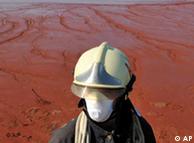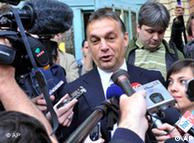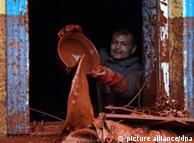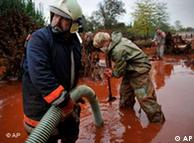27 October 2010 Last updated at 10:55 GMT Former Cobra member Col Richard Kemp says security measures should be regularly reviewed
The UK airline industry has backed British Airways chairman Martin Broughton's call for changes to airport security checks.
Mike Carrivick, of BAR UK, which represents more than 80 airlines, said the industry should "step back and have a look at the whole situation".
Mr Broughton said some "completely redundant" security checks should go.
The Department for Transport said there were no plans to change rules on checking laptops and shoes.
Practices such as forcing passengers to take off their shoes should be abandoned, Mr Broughton added.
Continue reading the main story US/UK SECURITY CHECKS
- Metal items placed in tray - UK and US domestic
- Liquids over 100ml removed - UK and US domestic
- Laptops removed - UK; not US on some domestic routes
- Shoes removed - UK but not on some European flights; not US domestic
- Metal detection archway - UK and US domestic
- Body scanner for some of those who fail security checks - UK and US domestic
- Pre-flight passengers records given to US authorities - UK; not US domestic
Source: Chris Yates, Yates Consulting
He also criticised the US for imposing increased checks on US-bound flights but not on its own domestic services, saying the UK should stop "kowtowing" to US security demands.
And he questioned why laptop computers needed to be screened separately.
Mr Carrivick, of BAR UK, which represents scheduled airlines such as Virgin Atlantic and BMI, said airport security seemed to be a "layered approach".
He added: "Every time there is a new security scare, an extra layer is added on to procedures.
"We need to step back and have a look at the whole situation. Standards change fairly regularly and this puts pressure on airports and airlines. We need to decide what we are trying to do and how best to do it."
BAA's chief executive Colin Matthews said security at Heathrow and its other airports was "defined by the authorities" and consisted of "one requirement laid on top of another".
He added: "There's European requirements, there's UK requirements and... US requirements laid on top of that.
"We could certainly do a better job for customers if we could rationalise all of that into a single, coherent process, and I'd love to have the chance to do that."
The US stepped up security in January in the wake of an alleged bomb plot.
It introduced tougher screening rules, including body pat-down searches and carry-on baggage checks, for passengers arriving from 14 nations which the authorities deem to be a security risk.
Passengers from any foreign country may also be checked at random.
Speaking at the UK Airport Operators' Association annual conference, Mr Broughton said that no-one wanted weaker security.
But he was quoted by the Financial Times as telling the conference: "We all know there's quite a number of elements in the security programme which are completely redundant and they should be sorted out."
'Consider essential' Mr Broughton, who is also chairman of Liverpool FC, added the UK should only agree to security checks that the US requires for passengers on domestic flights.
"America does not do internally a lot of the things they demand that we do," he said. "We shouldn't stand for that.
"We should say, 'We'll only do things which we consider to be essential and that you Americans also consider essential'."
Airport security worldwide has risen since the 9/11 terrorist attacks, and in December 2001 London-born Richard Reid attempted to blow up a commercial flight in the United States, using bombs hidden in his shoes.
The UK's overall threat level, set by the Joint Terrorism Analysis Centre, remains at severe, which means that an attack is highly likely.
Transport Secretary Philip Hammond said: "Security is, and will remain, a continuing challenge to the industry and the delivery of effective aviation security must be at the heart of the aviation policy debate.
"I intend to develop a new regulatory system - one where the government concentrates on setting the security outcomes that need to be achieved, and frees up operators to devise the security processes needed to deliver them in line with EU requirements."
Mr Hammond also said that further announcements would be made "in due course".
Continue reading the main story “Start Quote
Security checks shouldn't be scrapped, but we shouldn't upset travellers with excessive checks”
End Quote Kim 55 Universal approach Chris Yates, an aviation security analyst, said scanning technology was sufficient to detect any suspicious devices.
He added: "We need to keep passengers safe, but there's also a whole bunch of security rules that could be eased out.
"We could be talking about getting rid of the shoe check, because the metal detectors at airports are sensitive enough to pick up the metal strap in my leather shoe, so they should be able to detect whatever might else be hidden in the heel of that shoe.
"There are better ways in which we can do things now at the airport checkpoint. The redesign of that checkpoint, in my opinion, is long overdue."
Col Richard Kemp, who was a member of the national crisis-management committee Cobra between 2002 and 2006, said a universal approach to airport security was needed.
"One of the key points in this is consistency, to make sure that if a security measure is necessary it's universally applied.
"I think people are annoyed and rightly; some airlines or some airports want one thing done, others don't and it doesn't make sense to the public."
'Different standards' And Admiral Lord West, a security minister in the previous Labour government, agreed security checks had become far too complicated.
"We were already talking with the Europeans and, of course, the problem is there's American demands as well.
"Just from my travelling in America it does seem that they have very different standards travelling within [the US].
"So I think the government does need... to push very hard to rationalise these things, working with airport authorities, with the airlines and getting a Europe-wide agreement."
The US's Transport Security Administration said it worked closely with its international partners to ensure the best possible security.
"We constantly review and evolve our security measures based on the latest intelligence," a spokesman said.
At no time should you endanger yourself or others, take any unnecessary risks or infringe any laws. In most cases a selection of your comments will be published, displaying your name as you provide it and location unless you state otherwise. But your contact details will never be published.




 l | t
l | t

![[SPILLCOM1]](http://si.wsj.net/public/resources/images/P1-AX934_SPILLC_DV_20101028190553.jpg) European Pressphoto Agency
European Pressphoto Agency 








 520)this.width=520" border="1" hspace="5" vspace="5">
520)this.width=520" border="1" hspace="5" vspace="5">


Do you think some airport security checks are excessive? Or do you think the current level of security is necessary? Send us your comments and experiences using the form below.